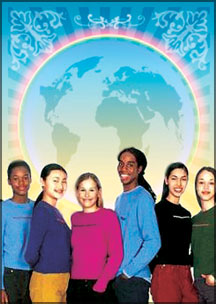
Focus on museums
Have you ever visited the Colombo National Museum? If the answer is
‘yes’, you would know just how valuable a treasure trove it is. It
houses such a vast collection of artefacts from areas as diverse as
heritage, archaeology and science that you could explore it all day and
still want to pay another visit.
Museums are an invaluable part of the world’s culture; they display
hundreds of exhibits related to history, culture, the natural world,
science and technology and a multitude of other subjects.
According to the International Council of Museums (ICOM), the
international organisation for museums and museum professionals, a
museum is defined as “an institution in the service of society and of
its development”.
|

The Louvre in France, one of the biggest museums in the
world |
They play an important role in society by providing value to a
community’s cultural heritage and highlighting the role of individuals
and groups whose unique features and differences are the
cornerstone(basis) of a particular society. Museums make cultural
exchanges possible, enrich cultures and develop mutual understanding,
cooperation and peace among people.
Although initially known only for their collections, now most museums
are well known for their active role in exploring social issues with
communities to contribute to their development.
It is to recognise and appreciate this new role that this year’s
International Museum Day on May 18 has been organised by ICOM under the
theme ‘Museums: agents of social change and development’.
The day’s activities have been organised to show how museums can help
bridge the digital divide between rich and poor countries through the
creative interaction between museum professionals. ICOM has invited its
members all over the world to take part in the day’s activities.
The special day has been celebrated since 1977 under a theme decided
each year by ICOM’s Advisory Committee. Over 20,000 museums representing
70 countries took part in the celebrations last year.
The ICOM, which is committed to the conservation, continuation and
communication to society of the world’s natural and cultural heritage,
has its headquarters in the UNESCO building in Paris, France.
It was established in 1946 and provides services to its over 24,000
member museums in over 150 countries, co-ordinates the activities of its
various committees and helps them carry out their programmes and
organises meetings and assemblies. It works closely with UNESCO and
carries out a part of UNESCO’s programme for museums.
How agriculture affects biodiversity
|

These logos for the event which have been designed from
traditional Gabba embroidered tapestry from Pakistan, were
donated to the CBD Museum of Nature and Culture by
Pakistan’s Minister for Environment in 2006. |
The International Day for Biological Diversity, which has been
declared by the United Nations, will be celebrated on May 22. The 2008
theme, as declared by the Secretariat on the Convention for Biological
Diversity (CBD) of the UN Environment Programme, is ‘Biodiversity and
Agriculture’.
Agriculture is an example of how human activities have affected the
ecosytem and its balance. The theme highlights the importance of
sustainable (ability to continue) agriculture not only to preserve
biodiversity, but also to ensure that we will be able to feed the world,
maintain agricultural livelihoods and enhance human well-being beyond
the 21st Century.
The special day has been declared to increase understanding and
awareness about biodiversity issues. Biodiversity, comprising the three
elements - genes, species and ecosystems - is the basis for
sustainability, productivity and resilience (ability to withstand
something) of agriculturl sytems, and is an important part of everyone’s
lives, providing food; raw materials such as cotton, wood and roots;
incomes; and livelihoods.
The challenge is to manage agricultural systems and the landscapes
associated with them in a sustainable manner to ensure that these
resources and ecosystems continue for the benefit of future generations.
Some of the activities that have been planned with regard to this day
are lectures, seminars, film presentations, cultural events, exhibitions
and school outreach activities.
In Sri Lanka too, national celebrations are being organised by the
government in collaboration with the Biodiversity Division of the
Ministry of Environment and Natural Resources, the Faculty of
Agriculture of the University of Peradeniya and the Department of
Agriculture.
Protecting cultural diversity
There is this line of thought that the deterioration of cultural and
traditional values goes hand in hand with increased development. This
doesn’t have to be so; development is not just about saving and
improving lives, it is also about protecting cultures, communities and
their dignity.
There is, in fact, a special day to commemorate this link between
cultural diversity and development. That is the World Day for Cultural
Diversity for Dialogue and Development which is observed on May 21.

The special events of the day will be organised and spearheaded by
the United Nations -Educational, Scientific and Cultural Organisation
(UNESCO). Cultural diversity has been one of the main areas of focus for
UNESCO ever since it was established over 60 years ago.
The adoption of the UNESCO Universal Declaration on Cultural
Diversity (on November 2, 2001) has confirmed its commitment to the
“fruitful diversity of cultures” in a spirit of dialogue and openness.
Poor countries are often culturally rich. When development projects
are being carried out in such countries, often with foreign aid and
expertise, they should be mindful about the culture that they are
working in, whether what they are doing is appropriate for that culture
or whether they are trying to impose their own cultural values on
someone else. Cultural diversity needs to be protected and nurtured.
This could be achieved by good development work supported by dialogue
among all the concerned parties. |
